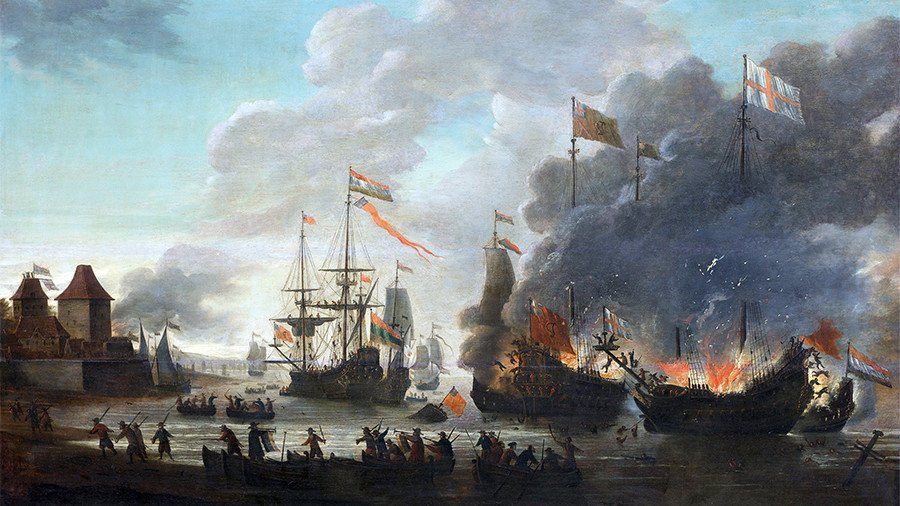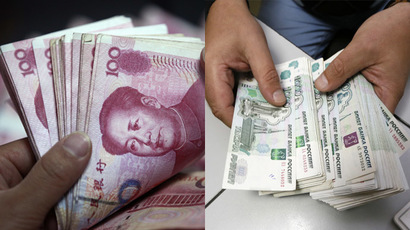Trade wars lead to real wars where the strong prey on the weak – economists to RT

The growing battle of tit-for-tat exchanges of tariffs between the US and China has raised fears of a possible trade war that could have a damaging economic impact globally.
On Tuesday, the White House pledged to slap an additional 25 percent tariff on a long list of Chinese products, including metals. Within hours Beijing retaliated with the promise to hike levies on $50 billion worth of US imports by 25 percent. The Chinese list includes soybeans, automobiles, chemicals and aircraft. In response, President Donald Trump threatened an additional $100 billion in tariffs against China.
Protectionism in international trade could not only wreck the economies of both nations but may disrupt global supply chains, raising prices for consumers across the globe. RT spoke to economists to discuss the potential impact of the latest developments.
Almost by definition, trade wars are negative-sum games and, as such, the chief antagonists would suffer, according to Dr. James Jingdong Wang, associate professor at City University of Hong Kong.
“In this case, the US and China are the top two economies of the world and also the largest two trading nations. Consequently, there could be little doubt that, should a full-fledged trade war break out, it would be a drag on the world economy at large,” said the expert.
Any war has winners and losers within countries, says David Laborde, a senior research fellow in the Markets, Trade and Institutions Division of IFPRI in Washington, DC. The expert stresses that some sectors of the US economy could benefit from the battle of tariffs, even if the majority lose.
'That war was lost many years ago...' - Trump on US-China trade war https://t.co/F5X13z2X3opic.twitter.com/f7UTVPQQW1
— RT (@RT_com) April 4, 2018
“At the country level, we can have countries that are net winners if they are big enough relative to their opponent. This is a bullying game,” the researcher told RT. “So, if you are the stronger player and you prey on the weak, you can win. Of course, if all the same players decide to stick together and retaliate against you, then you will lose.”
If US wants a trade war, China is ready to fight - official https://t.co/LhzN3kdOXupic.twitter.com/rKZFU8F3CM
— RT (@RT_com) April 5, 2018
According to the expert, historically, many trade wars have led to actual wars. “It exacerbates tensions, cuts economic linkages and interdependencies, and when economies are severed and opinions heated with chauvinistic rhetoric, then military action could start,” Laborde told RT.
The analyst expressed hopes that the adversaries learned lessons of the past. “Now, while a subsidy war between the EU and the US (on agricultural products or aeronautic sector in the ‘80s, ‘90s) will have never led to a military conflict, the overall situation with China is much more sensitive,” he said.
#China warns #TradeWar will directly hit US consumers & financial markets https://t.co/bDpRDNofvxpic.twitter.com/wXCuaRBSjd
— RT (@RT_com) March 24, 2018
The bigger fear over the current conflict is that escalating retaliatory tariffs could undermine institutions such as the World Trade Organization, which have underpinned the world trading system since the aftermath of World War II and have prevented the outbreak of large-scale trade wars, according to William Hauk, Jr., assistant professor in the Department of Economics at the Darla Moore School of Business at the University of South Carolina.
“I believe that international trade is generally mutually beneficial to the countries that engage in it. Therefore, I am not of the opinion that trade wars can be ‘won,’” the economist told RT. “The best possible outcome is for both sides to come to the table and work out their disputes in a transparent fashion.”
For more stories on economy & finance visit RT's business section















